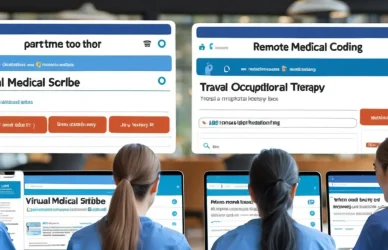Negotiating your salary can be intimidating, but it’s a crucial skill for healthcare professionals in the USA. With the rising cost of living and the increasing demand for qualified healthcare workers, it’s more important than ever to know how to advocate for fair compensation1. This article provides a comprehensive guide to salary negotiation specifically for healthcare professionals, empowering you to secure the compensation you deserve.
Understanding Your Market Value
Before entering any negotiation, it’s essential to understand your market value. This means researching what other professionals with similar qualifications and experience are earning in your geographic area and specialty. Several factors can influence your market value, including:
- Education and Training: Higher levels of education and specialized training generally command higher salaries. For example, a nurse with a Master’s degree in nursing (MSN) will likely have a higher earning potential than a nurse with an Associate Degree in Nursing (ADN)2.
- Experience: As you gain experience, your skills and knowledge increase, making you more valuable to employers. A physician with 10 years of experience will typically earn more than a recent graduate3.
- Location: Salaries can vary significantly depending on the cost of living and demand for healthcare professionals in different regions. For instance, a nurse in California may earn more than a nurse in Mississippi due to the higher cost of living and greater demand in California1.
- Specialty: Some specialties are in higher demand or require more specialized training, leading to higher earning potential. For example, anesthesiologists and urologists often have higher salaries than family medicine physicians3.
- Patient Volume and Productivity: In some settings, higher patient volume and productivity can translate to higher earnings. A physician who sees more patients or performs more procedures may earn more than a physician with a lower patient volume3.
- Industry Trends: The healthcare industry is constantly evolving, with new technologies and changing market forces influencing compensation. For example, the increasing demand for telehealth services may lead to higher salaries for healthcare professionals with expertise in this area4.
In addition to these individual factors, broader economic conditions can also impact healthcare salaries. The industry’s desire for increased profits, the introduction of new technologies, and changes in competition can all affect compensation trends4.
To provide a clearer picture of salary expectations across different healthcare roles, consider the following examples:
Job | Qualification | Salary |
Physicians and Surgeons | Doctoral or professional degree | $208,000+ |
Podiatrists | Doctoral or professional degree | $145,840 |
Pharmacists | Doctoral or professional degree | $128,570 |
Audiologists | Doctoral or professional degree | $78,950 |
Medical Sonographers and Cardiovascular Technologists and Technicians | Associate degree | $75,380 |
Occupational…source | 5 |
|
It’s also important to be aware of regional variations in salary. Here are the top-paying states and metro areas for doctors in the USA:
Top 10 Earning States for Doctors:
- Wisconsin: $397,000
- Indiana: $372,000
- Georgia: $363,000
- Connecticut: $362,000
- Missouri: $361,000
- New Jersey: $360,000
- South Carolina: $360,000
- Florida: $359,000
- California: $358,000
- Michigan: $356,000 6
To research your market value, consider using online resources such as salary databases (e.g., Glassdoor, Salary.com), professional organizations (e.g., AAFP’s Career Benchmark Dashboard), and industry salary surveys (e.g., those from MGMA, Sullivan, Cotter and Associates)7. Networking with colleagues in your field can also provide valuable insights into local salary trends8.
Determining Your Worth
While understanding the general market value for your profession is essential, it’s equally important to determine your unique worth as a healthcare professional. This involves a more personalized assessment of your skills, experience, and contributions. Two key approaches can help you in this process:
- SWOT Analysis:
A SWOT analysis is a strategic planning tool that helps you identify your internal strengths and weaknesses, as well as external opportunities and threats. In the context of salary negotiation, a SWOT analysis can help you:
- Strengths: Identify your key skills, qualifications, and accomplishments that make you a valuable asset to employers.
- Weaknesses: Recognize areas where you may need to improve or gain further experience to increase your earning potential.
- Opportunities: Explore potential career paths or specializations that align with your strengths and offer higher earning potential.
- Threats: Consider external factors that may affect your salary negotiations, such as competition from other candidates or budget constraints within the organization10.
- Combining Primary and Secondary Market Research:
To gain a comprehensive understanding of your worth, combine primary and secondary market research:
- Primary Research: This involves gathering firsthand information through activities like informational interviews with colleagues, networking events, and attending industry conferences. These interactions can provide valuable insights into salary expectations and negotiation strategies within your specific field and geographic area.
- Secondary Research: This involves analyzing existing data and reports, such as salary surveys, industry publications, and online resources. This type of research provides a broader understanding of market trends and salary benchmarks11.
By combining these two approaches, you can develop a well-rounded understanding of your individual worth in the healthcare job market.
Preparing for a Salary Negotiation
Once you have a clear understanding of your market value and your unique worth, it’s time to prepare for the negotiation itself. This involves:
- Knowing Your Bottom Line: Determine the minimum salary you’re willing to accept. This will help you stay focused and avoid accepting an offer that’s below your worth12.
- Practicing Your Pitch: Prepare a concise and compelling explanation of why you deserve the salary you’re requesting. Highlight your skills, experience, and accomplishments, and quantify your contributions whenever possible. For example, instead of simply stating that you improved patient satisfaction, quantify your impact by saying “I implemented a new patient communication protocol that resulted in a 15% increase in patient satisfaction scores.” 13
- Gathering Supporting Documentation: If possible, gather documentation to support your claims, such as performance reviews, patient satisfaction scores, or letters of recommendation14.
- Understanding the Organization’s Compensation Structure: Research the organization’s typical salary ranges and benefits packages to ensure your expectations are realistic7.
- Considering Your Options: Explore potential career mobility options within the organization and consider applying for other jobs to increase your bargaining power7.
- Timing Your Request: Avoid revealing your salary requirements too early in the hiring process. It’s generally best to wait until you have received a formal offer before discussing compensation. This allows you to gather more information about the position and the organization’s expectations12.
Common Negotiation Tactics and How to Respond
Employers may use various negotiation tactics during salary discussions. Here are a few common tactics and how to respond to them:
- Lowball Offer: If the initial offer is significantly below your expectations, don’t be afraid to counter with a higher number. Be prepared to justify your counteroffer with your research and accomplishments15.
- Delaying Tactics: If the employer tries to delay the negotiation process, politely but firmly reiterate your interest in the position and your desire to discuss compensation16.
- “This is all we can offer”: If the employer claims they have limited budget flexibility, explore other forms of compensation, such as signing bonuses, performance-based incentives, or professional development opportunities14.
- “Take it or leave it”: While this tactic can be intimidating, remember that you have the power to walk away if the offer doesn’t meet your needs12.
- Hardball Tactics: Be aware of more aggressive tactics, such as the “silent treatment” (ignoring your requests or questions), “time pressure” (imposing a tight deadline for acceptance), or “exploding offer” (an offer with an extremely short expiration date). These tactics are often used to pressure you into accepting a less favorable offer. If you encounter these tactics, remain calm and assertive, and don’t be afraid to push back or walk away if necessary18.
Communicating Your Value During Negotiation
Effective communication is crucial during a salary negotiation. Here are some tips to help you effectively communicate your value:
- Highlight Your Achievements: Clearly articulate your accomplishments and how they have benefited your previous employers or patients. Use specific examples and quantify your contributions whenever possible. For example, instead of simply stating that you improved patient satisfaction, quantify your impact by saying “I implemented a new patient communication protocol that resulted in a 15% increase in patient satisfaction scores.” 19
- Focus on the Mutual Benefit: Frame the negotiation as a collaborative effort to reach an agreement that benefits both you and the employer. Emphasize how your skills and experience will contribute to the organization’s success14.
- Be Confident and Assertive: Believe in your worth and communicate your expectations clearly and respectfully. Avoid being overly aggressive or confrontational, but don’t be afraid to advocate for yourself12.
- Listen Actively: Pay attention to the employer’s perspective and be prepared to address their concerns. This shows that you’re willing to work together to find a mutually agreeable solution7.
- Be Open to Compromise: While it’s important to have a clear goal in mind, be flexible and willing to negotiate on different aspects of the compensation package, such as benefits, bonuses, or professional development opportunities7.
- Build Rapport: Remember that salary negotiation is not just about numbers; it’s also about building relationships. Presenting yourself as someone who is polite, respectful, and easy to work with can create a more positive and collaborative atmosphere, increasing the likelihood of a successful negotiation15.
Communicating Your Value During Negotiation
Effective communication is crucial during a salary negotiation. Here are some tips to help you effectively communicate your value:
- Highlight Your Achievements: Clearly articulate your accomplishments and how they have benefited your previous employers or patients. Use specific examples and quantify your contributions whenever possible. For example, instead of simply stating that you improved patient satisfaction, quantify your impact by saying “I implemented a new patient communication protocol that resulted in a 15% increase in patient satisfaction scores.” 19
- Focus on the Mutual Benefit: Frame the negotiation as a collaborative effort to reach an agreement that benefits both you and the employer. Emphasize how your skills and experience will contribute to the organization’s success14.
- Be Confident and Assertive: Believe in your worth and communicate your expectations clearly and respectfully. Avoid being overly aggressive or confrontational, but don’t be afraid to advocate for yourself12.
- Listen Actively: Pay attention to the employer’s perspective and be prepared to address their concerns. This shows that you’re willing to work together to find a mutually agreeable solution7.
- Be Open to Compromise: While it’s important to have a clear goal in mind, be flexible and willing to negotiate on different aspects of the compensation package, such as benefits, bonuses, or professional development opportunities7.
- Build Rapport: Remember that salary negotiation is not just about numbers; it’s also about building relationships. Presenting yourself as someone who is polite, respectful, and easy to work with can create a more positive and collaborative atmosphere, increasing the likelihood of a successful negotiation15.
Negotiation Styles
Understanding different negotiation styles can help you approach salary discussions more effectively. Here are five common bargaining styles:
Negotiation Style | Characteristics | Importance of Outcome vs. Relationship |
Competitive | Aggressive, focused on…source | 21 |
Consider your personality and the specific negotiation context when choosing your approach. For example, a collaborative style might be suitable for long-term employment relationships, while a competitive style might be more appropriate in a one-time negotiation.
Concluding the Negotiation
Once you’ve reached an agreement, get the offer in writing before formally accepting. If the employer doesn’t provide a formal letter, you can write your own summarizing the agreed-upon terms and ask them to sign it12. Remember that not all negotiations go as planned. If you’re unable to reach an agreement that meets your needs, don’t be afraid to walk away. There are other opportunities out there, and knowing your worth will help you find the right fit.
It’s also important to consider seeking legal advice, especially when negotiating complex contracts or employment agreements. An attorney specializing in employment law can help ensure that your rights and interests are protected and that the agreement is in your best interest22.
Synthesis and Conclusion
Negotiating your salary is an essential skill for healthcare professionals in the USA. By understanding your market value, preparing thoroughly, and communicating effectively, you can increase your earning potential and secure the compensation you deserve. Remember to be confident, assertive, and persistent throughout the process. Your skills and dedication are valuable assets in the healthcare industry, and advocating for fair compensation is a crucial step in your professional journey.
To recap, here are some key takeaways from this article:
- Know Your Worth: Thoroughly research your market value and determine your unique worth based on your skills, experience, and contributions.
- Prepare and Practice: Prepare a compelling pitch, gather supporting documentation, and practice your negotiation strategy.
- Communicate Effectively: Be clear, concise, and assertive when communicating your expectations.
- Be Aware of Negotiation Tactics: Recognize and respond effectively to common negotiation tactics used by employers.
- Consider Your Options: Be open to compromise, but don’t be afraid to walk away if the offer doesn’t meet your needs.
Take the time to assess your current situation, research your options, and practice your negotiation skills. By investing in yourself and your professional development, you can confidently advocate for the compensation you deserve and achieve your career goals.
Works cited
- Understanding the Landscape of RN Salaries Across the USA – All Med Search, accessed January 21, 2025, https://www.allmedsearch.com/2024/04/18/understanding-the-landscape-of-rn-salaries-across-the-usa/
- Healthcare Provider Salaries: A Comprehensive Guide – Refer Me, accessed January 21, 2025, https://www.refer.me/blog/healthcare-provider-salaries
- From Credentialing to Location: Key Factors Influencing Physician Pay – Credsy, accessed January 21, 2025, https://credsy.com/blog/key-factors-influencing-physician-pay
- Are Health Industry Compensation Costs a Factor Influencing Employer Health Care Costs? – Bureau of Labor Statistics, accessed January 21, 2025, https://www.bls.gov/opub/mlr/cwc/are-health-industry-compensation-costs-a-factor-influencing-employer-health-care-costs.pdf
- What Do Health Care Jobs Pay? Salaries, Job List, and More – Coursera, accessed January 21, 2025, https://www.coursera.org/articles/what-do-health-care-jobs-pay
- Average Doctor Salaries by Specialty – Kaplan Test Prep, accessed January 21, 2025, https://www.kaptest.com/study/mcat/doctor-salaries-by-specialty/
- How to Negotiate Your Salary in Healthcare – iHire, accessed January 21, 2025, https://www.ihire.com/resourcecenter/jobseeker/pages/how-to-negotiate-your-salary-in-healthcare-
- Negotiating Like a Pro: Mastering the Art of Physician Salary Negotiation – PhysEmp Blog, accessed January 21, 2025, https://recruiter.physemp.com/blog/career-beat/negotiating-salary-for-physicians/
- Healthcare Fair Market Valuation – ValueScope Inc., accessed January 21, 2025, https://www.valuescopeinc.com/healthcare-fair-market-valuation/
- How to Do Healthcare Market Research for Your Medical Practice – Kiwi Health, accessed January 21, 2025, https://www.kiwihealth.com/blog/how-to-do-healthcare-market-research-for-your-medical-practice
- DIY Market Research for Healthcare: Where to Start – Attest, accessed January 21, 2025, https://www.askattest.com/blog/guides/market-research-for-healthcare
- Salary/Offer Negotiation – Interviewing – School of Public Health – University of Minnesota, accessed January 21, 2025, https://www.sph.umn.edu/current/careers/students/resources/interviewing/salary-offer-negotiation/
- How to Negotiate Salary Increases In Healthcare – AchieveCE, accessed January 21, 2025, https://achievece.com/blog/how-to-negotiate-salary-increases-in-healthcare
- Mastering Salary Negotiation: A Guide for Healthcare Workers | hrforhealth.com, accessed January 21, 2025, https://hrforhealth.com/blog/salary-negotiation
- What Doctors Can Expect During Physician Salary Negotiation, accessed January 21, 2025, https://physiciansthrive.com/services/legal/contract-negotiation/expect/
- How to Negotiate Salary via Email and Get the Offer You Deserve – Headway, accessed January 21, 2025, https://makeheadway.com/blog/how-to-negotiate-salary-offer-via-email/
- Negotiating physician salaries: Addressing compensation misconceptions, accessed January 21, 2025, https://www.medicaleconomics.com/view/negotiating-physician-salaries-addressing-compensation-misconceptions
- 10 Hard-Bargaining Tactics & Negotiation Skills, accessed January 21, 2025, https://www.pon.harvard.edu/daily/batna/10-hardball-tactics-in-negotiation/
- How to Negotiate Your Salary in Healthcare Amid Medicare and Medicaid Cuts | iHire, accessed January 21, 2025, https://www.ihire.com/resourcecenter/jobseeker/pages/how-to-negotiate-your-salary-in-healthcare-amid-medicare-and-medicaid-cuts
- A Guide to Salary Negotiation: 9 Tips for Communication – Galt Foundation, accessed January 21, 2025, https://galtstaffing.com/2023/09/13/a-guide-to-salary-negotiation-9-tips-for-communication/
- Negotiation for Physicians: Practical Strategies to Improve Bargaining Success | AAFP, accessed January 21, 2025, https://www.aafp.org/pubs/fpm/issues/2023/0500/physician-negotiation.html
- How to Negotiate a Physician Salary – AAFP, accessed January 21, 2025, https://www.aafp.org/family-physician/practice-and-career/managing-your-career/employment-contracting/negotiating-physician-contracts/how-to-negotiate-physician-salary.html







